- Getting around Lijiang. Dont stay in the Old Towns more than 2 days, there is nothing to do. KRISS Oct 9, 2013 05:46
- 2013 Beijing Temple Fair BENNYLAU Feb 26, 2013 03:29
- Malaysian traveling from KUL - LAX vis Shanghai PVG ZATI_DY Jan 3, 2013 20:15
Standing at the Edge of the World
- Views: 4254
- |Vote: 0 0
- |Add to Favorites
- |Recommend to Friends
'mind boggling'
I wait only twenty minutes for the next bus – just enough time to use the bathroom and read the station signage. One large sign graphically explains the eight ‘forbidden something’ – mind explosion, mind poisoning, mind chemical and mind erosion – which leaves me mind boggled but very amused. The bus fills quickly and leaves on time. I am both happy and relieved as I only have the afternoon to spend on this excursion and it will take another hour to get there. I’ve not really left myself enough time to explore but I am wary of being caught out without a bed for the night in this remote region.
The road has followed the coast for the most part, behind low coastal dunes and small headlands, across sandy river estuaries and semi-arid farmlands. It has taken the best part of the morning just to get to Weihai, on the beautiful north coast of the Shandong Peninsular. The city of Weihai is relatively small and stretches for kilometers along a shallow sweeping bay. Both the long distance bus and train stations are on the far eastern edge of the city – strange considering there are very few destinations to the east of Weihai – but this is not my ultimate destination today.
Lands end
Small open fishing boats – just little black dots – pull in a days catch miles offshore. Later the road meanders further inland over rolling hills and farmlands. We take a sharp turn off the main road toward some rocky crags in the near distance. The bus makes a couple of stops in what appears to be a theme park in the lee of these rocky hills. Just one of a multitude of such ventures often built at the wrong time in the wrong location with the wrong expectations – now a bit of a ‘white elephant’. Back on the road we are just a few kilometers from our destination - to the right views of small villages, boats, beaches and the water, and to the left more of those rugged granite outcrops rising in stark contrast to the surrounding green fields.
Passing through one last village the bus stops and parks in the shade of a massive traditional gate announcing our arrival at Chengshantou – literally the end of the road for the Middle Kingdom and one of those especially interesting little places off the beaten track. I’m told the last bus back to Weihai will leave at 4.00 pm which doesn’t leave me long. I buy the rather over priced entrance ticket and quickly walk the last few hundred meters to the very edge of the Middle Kingdom. On my right is the deep blue Yellow Sea lapping gently on the rocks below.
Rustic charm of thatched roofs
Overhead a brilliant blue sky is streaked with high thin clouds – a perfect picture. I make the obligatory photo stops like the other tourist who have ventured this far, taking a quick look at the lighthouse, read up on the ‘big fog flute’ used to warn seamen of the imminent dangers of the cape before the lighthouse was built. Then I hurry back past the bus, letting the driver know that he is to look for me in the village. With barely an hour I head out to explore the small fishing village nestled in the lee of Chengshantou.
Corn grows tall beside the protective stonewalls of the houses – in neat rows – narrow alleys in both front and back. Each courtyard home faces south; the windowless stonewalls shielding them from the harsh winter winds that blow in from the north. A small covered archway over the front gate gives the only access to the small courtyard gardens. Rambling creepers with colourful flowers, sunflowers chasing the sun and a couple of large shade trees compliment the simple texture of the stone and thatch.
A warm welcome
More than half the homes in this section of the village are around sixty years old and still have thatched roofs which make most of the villages in the region unique. I wander down alleys that have recently been dug up to install more modern plumbing and drainage, peeking into courtyards with open gates. Taking care not to be intrusive I am looking for an opportunity to have a closer look.
A small friendly dog barks as I approach its gate and this offers me a chance to say hello not only to the noisy pouch but to the retired couple who come out to see what the fuss is about. We exchange greetings and when I ask if I can have a look their response is immediate and warm. They take me into the living room, the largest room in the main section of the house along the northern wall with a bedroom at either end.
A retiring life
Recent renovations have created a clean, bright and tidy home with lots of windows to catch the winter sun. To the left of the courtyard was the main kitchen, attached to the living room in the main hall. Almost entirely clad in glass on the roof and internal walls this kitchen is only used for preparation of meals. The cooking was done is a smaller detached kitchen in the courtyard to the right of the entrance. This would reduce the risk of fire in these homes of stone, timber and thatch.
After showing me around the couple invite me to sit in the cool of the courtyard where we chat about our homes and families. The little watchdog sleeps in a straw stuffed tyre just inside the front gate. An old rusty bicycle is amongst an assortment of retired odds and ends about the house. A much newer modern bicycle also stands by the gate. During our chat I understand the couple have both retired but I’m not able to find out what they had done for a living – fishing perhaps!!!!
A reminder of my father
I made my farewells, wishing I could stay longer chatting with this lovely couple but my time is pressing on. Just down the alley I come across another group of villagers both men and women. An older man is mending a net. After greeting them all I am invited to sit once again in the shade and we chat some more. This time about where I am from, how I have traveled to China and how long did my flight take me. Eventually everyone leaves except the old man mending his net. I tell him how he reminds me of my own father who was also a seaman and a fisherman. Like this man he would also spend hours sitting in the shade of a tree on the riverbank near our home mending his fishing nets.
All too soon it is time to leave. I take a few more photos around this quaint and unique village wondering how much longer these thatched roofs would remain. Across the street and up the gentle slope, white tiled, two story homes built in the same style as the original traditional homes overlook their older cousins and the sea but they lack all the rustic charm of the old village.
A special seat
I buy an ice block from one of many small stores while I wait for the bus avoiding for the umpteenth time the question of my age which is often asked good naturedly by curious men and women both. I never cease to be amazed at how accurate the men are at guessing something close. I jokingly take offense occasionally if they are wildly off the mark.
The bus arrives on time and I am offered the jockey seat right up front opposite the driver, climbing over the engine housing, which also doubles as a seat on most rural buses. It is only now that I notice that we are heading directly into the already low, setting sun and it will be right in my eyes all the way. I spare a thought for the driver who does this last run regularly. Before long the bus is not just full but packed to bursting and I am glad to have a seat. We make one more stop in the rather dreary small town about five or six kilometers from the cape where another large group of people are waiting, expecting to ride the bus.
The trek back
This town is full of small KTV bars and I assume just as many small guesthouses. Signs in and around the cape are also in Korean, which suggests that many visit here for business and or pleasure. After some jostling and re-arranging of luggage and passengers we leave for Weihai. I must be the only passenger who actually has one whole seat to myself and some space around me. We leave no-one behind and a few bags and small freight items are jammed against the windscreen and around my feet.
Once we leave this town the bus does not stop again leaving a lot of disappointed people stranded by the roadside. This must happen regularly so I am hugely grateful that I am on the bus and that I have a seat. I’m even grateful that I am squinting into the hot , soon setting sun, and not the alternative - a close crush of hot perspiring bodies. Our driver is more cautious, taking corners slowly until we stop at a large intersection where many of our passengers off-load finding alternative transport.
I have no idea if our overloaded condition is the reason that we returned along the coast road but it was far more interesting for me. All along the coast, the small fishing boats I had seen earlier were returning to shore. Because the bay is shallow, tidal changes in water level mean that the tide goes out a long way. To compensate for this an ingenious rig of two poles, one onshore and the other off shore in deeper water have been constructed at regular intervals. A wire rope is strung between the poles and the boats are hosted out of the water and pulled ashore where they are stored safely above the high water line each evening and just as importantly during inclement weather.
The happy ending
With still plenty of daylight left when I arrived back in Weihai I had time to seek out a cheap room for the night. I did not have to look far as I was approached again by a very nice but persistent woman who showed me several options across the street from the station until I was both satisfied with the room and the price. She disappeared just as quickly as she had appeared.
That evening I sat outdoors with the locals eating Weihai style barbeque washed down with a locally brewed light beer. One of my waitresses – once she got over the fact that I was speaking Mandarin – related a story that one of her teachers had told her university class. Quote ‘Australia has no flies because it is such a clean country.’
I tried hard not to laugh too much – she had obviously never been to Australia where of course we have flies. There are some places where you just have to stay in your car because the flies are so thick, slow and ‘sticky’. In fact we have a joke that swiping at flies is our ‘National Salute’.
With the sun long gone beneath the horizon, I reflected on my wonderful but brief visit to the edge of the Middle Kingdom. It had been a great day – both interesting and amusing to the very end.



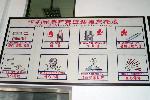
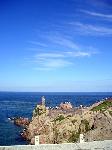
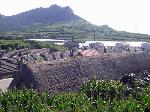
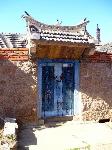
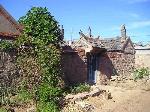
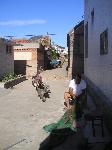
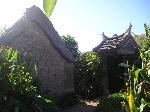
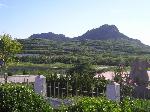
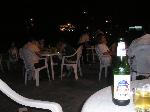
 Copyright © 1998-2026 All rights reserved.
Copyright © 1998-2026 All rights reserved.